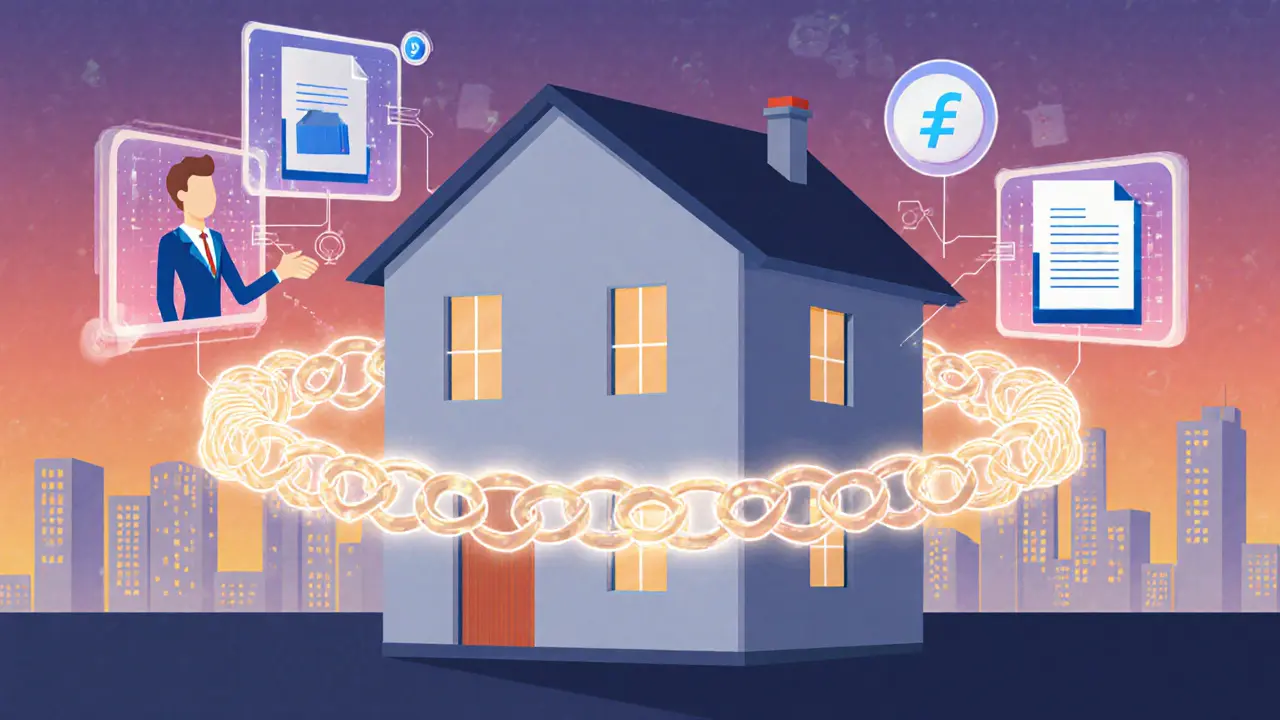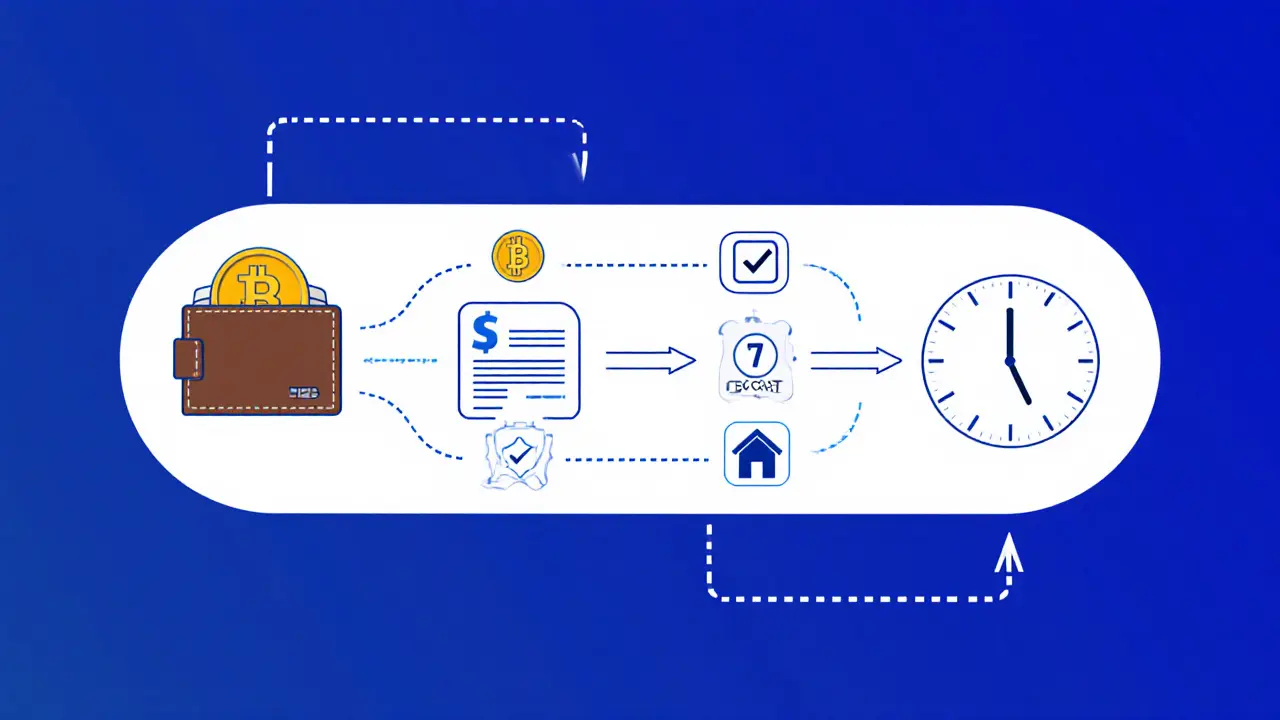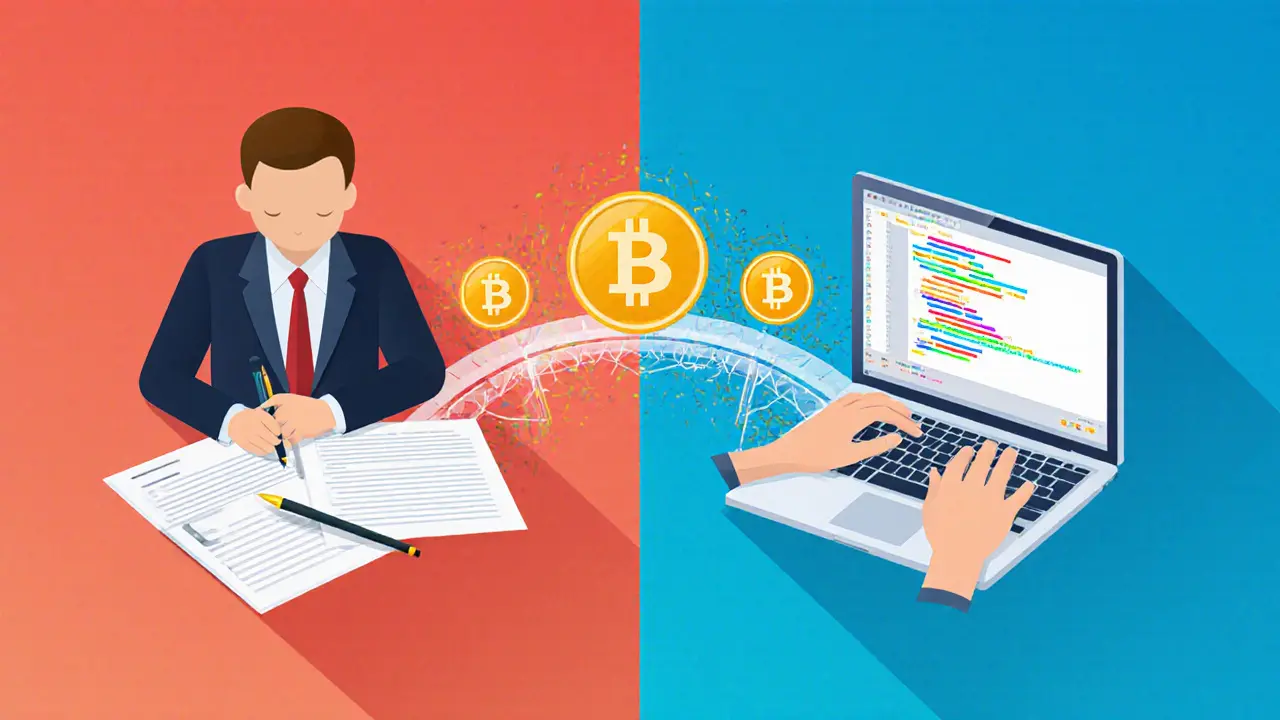
Smart Contract Savings Calculator
Property Sale Price
Your Savings Estimate
Imagine selling your house without a real estate agent, without waiting weeks for bank approvals, and without stacks of paperwork signed by hand. All it takes is a few lines of code and a blockchain transaction. This isn’t science fiction-it’s happening right now, and it’s called smart contracts for property sales.
What Exactly Is a Smart Contract in Real Estate?
A smart contract is a self-executing agreement written in code and stored on a blockchain. When certain conditions are met-like a buyer sending the full payment-the contract automatically transfers ownership of the property. No middleman. No delays. No signatures on paper.
In traditional property sales, you’ve got agents, lawyers, escrow officers, title companies, banks, and government offices all passing documents back and forth. Each step adds days, sometimes weeks, to the process. With smart contracts, all of that gets replaced by automated rules. If payment clears, title transfers. If inspection passes, funds release. If mortgage is approved, ownership updates. All in minutes.
The contract itself holds everything: the property’s legal description, the agreed price, deadlines, contingencies, and even who pays the transfer taxes. Once deployed on the blockchain, it can’t be changed. That’s the point. It’s tamper-proof, transparent, and visible to everyone involved.
How Smart Contracts Cut Costs and Speed Up Sales
Real estate transactions are expensive. In New Zealand, average closing costs for a home sale can hit $10,000 or more-mostly going to agents, lawyers, and administrative fees. Smart contracts slash that by up to 50% by removing intermediaries.
Take escrow. Normally, a third party holds the buyer’s money until all conditions are met. With a smart contract, the money sits in a secure digital wallet tied to the contract. It only releases when the code says so: after the buyer’s bank confirms funds, the title office verifies no liens, and the seller uploads the signed deed. All verified automatically.
Time savings are just as dramatic. A typical property sale in Wellington takes 40-60 days. With smart contracts, that drops to 7-14 days. Why? Because there’s no waiting for someone to open an email, print a form, or book an appointment. The system runs 24/7.
And it’s not just faster-it’s more accurate. Human error causes 83% of property deals to stall or fail, according to industry data. Missed signatures, wrong account numbers, lost documents. Smart contracts don’t make those mistakes. They follow the code exactly.
How It Works: The Step-by-Step Process
Here’s how a smart contract handles a property sale from start to finish:
- Agree on terms: Buyer and seller negotiate price, closing date, inspections, and contingencies-just like a normal sale.
- Code the contract: A developer writes the rules into a smart contract using a language like Solidity (on Ethereum) or Move (on Aptos). The contract includes the property ID, payment amount, and conditions for release.
- Verify identity: Both parties sign in with digital wallets and complete KYC (Know Your Customer) checks through a trusted service.
- Lock funds: The buyer sends the purchase amount to the contract’s escrow wallet. The money is frozen until conditions are met.
- Trigger conditions: The contract checks for: (1) payment received, (2) property title cleared, (3) inspection report uploaded, (4) mortgage approval confirmed.
- Auto-execution: When all conditions are satisfied, the contract sends the title to the buyer’s digital wallet and releases funds to the seller.
- Update public ledger: The new ownership record is permanently stored on the blockchain and synced with the land registry.
Every step is recorded and can’t be erased. If someone tries to tamper with the title later, the blockchain shows the original, unaltered version.

Real-World Benefits: What Buyers and Sellers Actually Experience
People who’ve used smart contracts for property sales say the biggest win is peace of mind.
One seller in Auckland sold her apartment in 9 days. She didn’t need an agent. She didn’t chase down the buyer’s bank for proof of funds. The contract did it all. She got paid the moment the buyer’s deposit cleared and the title was verified.
Buyers love the transparency. They can log in and see exactly where the transaction stands: “Payment received,” “Title search in progress,” “Inspection passed.” No more guessing or calling your lawyer every day.
And for international buyers? It’s a game-changer. A Singaporean investor bought a holiday home in Queenstown without ever stepping foot in New Zealand. All documents were signed digitally. The contract handled currency conversion, tax withholding, and title transfer automatically.
Even rental agreements are being automated. Landlords now use smart contracts to collect rent on the first of every month. If rent isn’t paid, the system locks the digital key to the property. No late fees, no court notices-just code doing its job.
The Big Hurdles: Why Smart Contracts Aren’t Everywhere Yet
Despite the benefits, smart contracts still make up less than 5% of real estate transactions globally. Why?
First, legal recognition. In many countries, including New Zealand, digital titles and blockchain-based transfers aren’t fully recognized by law. The Land Transfer Act still requires paper deeds and wet signatures in most cases. Until that changes, smart contracts can’t replace the system-they can only supplement it.
Second, complexity. Writing a smart contract isn’t like drafting a Word doc. You need developers who understand both blockchain and real estate law. A mistake in the code-like forgetting a contingency clause-could cost someone their house.
Third, trust. People are used to human agents. They want someone to call when things go wrong. With a smart contract, if something breaks, you can’t just call your broker. You need a coder, a blockchain expert, and possibly a lawyer-all at once.
And then there’s the irreversible nature of blockchain. Once a transaction is confirmed, it’s final. No do-overs. That’s great for security, but terrifying if you accidentally send the wrong amount or misread a clause.

What’s Next? The Future of Blockchain Property Sales
The technology is evolving fast. New platforms are launching user-friendly interfaces that let non-tech people create smart contracts with drag-and-drop tools. Think of it like building a website with Canva-no coding needed.
Some startups are integrating smart contracts with IoT devices. Imagine your house automatically unlocking for the buyer’s inspection, or the smart thermostat adjusting to the new owner’s preferences the moment ownership transfers.
Tokenization is another big trend. Instead of buying a whole house, you can buy 10% of it as a digital share. The smart contract splits rental income and maintenance costs automatically among all owners. This opens up real estate investment to people who can’t afford a full property.
Regulators are catching up. In 2024, New Zealand’s Land Registry began piloting blockchain-based title transfers in select regions. The goal? To make digital ownership legally binding by 2027.
Should You Use a Smart Contract for Your Next Property Sale?
If you’re selling a straightforward home with no complex conditions-no contested boundaries, no inheritance disputes, no unusual financing-then yes. Smart contracts can save you time, money, and stress.
But if your sale involves multiple heirs, a contested title, or a buyer with a shaky credit history, stick with the traditional process for now. Human judgment still matters in messy situations.
The smart move? Use a hybrid approach. Start with a smart contract for the simple parts-payment, title transfer, documentation. Keep your lawyer for the complex stuff-contingencies, disputes, legal wording.
This isn’t about replacing people. It’s about removing the busywork so people can focus on what really matters: helping clients, solving problems, and building trust.
Frequently Asked Questions
Can smart contracts legally transfer property ownership in New Zealand?
Currently, New Zealand’s Land Transfer Act requires physical signatures and paper-based title updates for legal ownership transfer. Smart contracts can automate parts of the process-like payment and document verification-but the final title change still needs to be registered through the official land registry. However, pilot programs are underway to make blockchain titles legally recognized by 2027.
What happens if the smart contract has a bug?
If the code has a flaw-like failing to check for an outstanding mortgage-the contract will still execute as written. That’s why smart contracts must be audited by third-party security firms before deployment. Some platforms now offer insurance policies that cover losses from coding errors. Always use a reputable developer and never skip the audit.
Do I need a digital wallet to use a smart contract for property?
Yes. You’ll need a secure digital wallet like MetaMask or a government-approved identity wallet to sign transactions and hold funds. These wallets act as your digital ID and bank account combined. You’ll also need to complete KYC checks through a certified provider to prove your identity before the contract activates.
Can I cancel a smart contract after it’s deployed?
No. Once a smart contract is live on the blockchain, it cannot be changed or deleted. That’s by design-it ensures trust. But you can build in escape hatches, like a multi-signature approval that requires 2 out of 3 parties to agree before funds are released. Always include these safeguards during the coding phase.
Are smart contracts cheaper than using a real estate agent?
Yes, significantly. In New Zealand, agents typically charge 2-4% of the sale price. A smart contract eliminates that fee entirely. You’ll still need a lawyer for legal advice and a developer to code the contract, but those costs are usually under $2,000 total-far less than a 3% agent fee on a $800,000 home.
Leave a comments